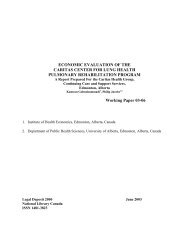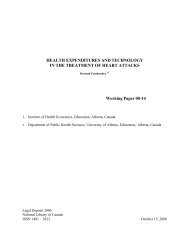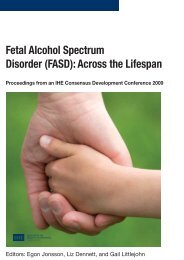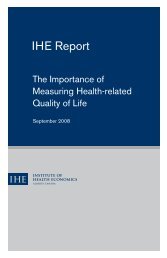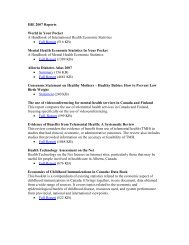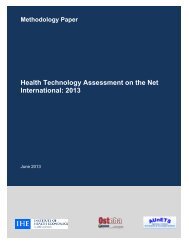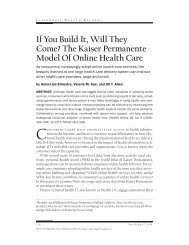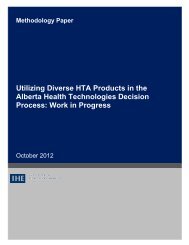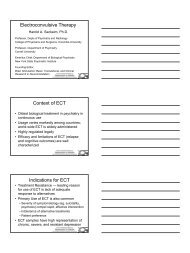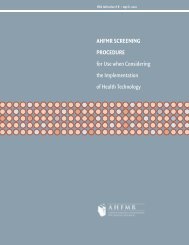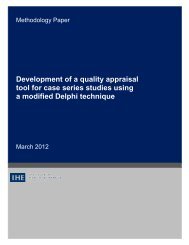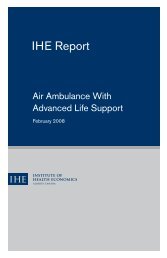Bariatric treatments for adult obesity - Institute of Health Economics
Bariatric treatments for adult obesity - Institute of Health Economics
Bariatric treatments for adult obesity - Institute of Health Economics
- No tags were found...
You also want an ePaper? Increase the reach of your titles
YUMPU automatically turns print PDFs into web optimized ePapers that Google loves.
AEs <strong>for</strong> sibutramineAs compared to a placebo, sibutramine increased both systolic and diastolic blood pressure andheart rate (the proportion <strong>of</strong> patients who experienced these AEs were not reported). 20 These sideeffects <strong>of</strong> sibutramine are <strong>of</strong> particular concern because even mild increases in blood pressure can beexpected to result in an increase in cardiovascular events in a population already at risk. Patients withpre-existing cardiovascular disease were excluded from these trials.Other adverse effects associated with sibutramine, occurring in 7% to 20% <strong>of</strong> patients, includedinsomnia, nausea, dry mouth, and constipation. 20AEs <strong>for</strong> rimonabantPsychiatric disorders—including depression, anxiety, irritability, and aggression—occurred in 6% <strong>of</strong>patients treated with rimonabant. 20Dropout rates <strong>of</strong> drug therapyThe overall dropout rates were high and were comparable in groups taking the anti<strong>obesity</strong>medication and in placebo groups, with overall dropout rates <strong>of</strong> 30% <strong>for</strong> orlistat, 34% <strong>for</strong>sibutramine, and 39% <strong>for</strong> rimonabant. 59 Median dropout rates due to drug side effects were highest<strong>for</strong> rimonabant at 15.0% (ranging from 12.8% to 17.5%), intermediate <strong>for</strong> sibutramine at 9.3%(ranging from 0.0% to 12.2%), and lowest <strong>for</strong> orlistat at 7.1% (ranging from 0.0% to 12.8%).Risk ratios <strong>for</strong> discontinuation due to adverse events were significantly increased <strong>for</strong> rimonabant andorlistat, but not <strong>for</strong> sibutramine. 59 Compared to placebo, the risk difference was the largest <strong>for</strong>rimonabant, followed by orlistat, while no significant difference was observed <strong>for</strong> sibutramine. 59The most common adverse events leading to drug discontinuation were gastrointestinal side effects<strong>for</strong> orlistat (40%) and psychiatric side effects <strong>for</strong> rimonabant (47%). 59In summary, the major safety concerns are gastrointestinal adverse events <strong>for</strong> orlistat, increases inblood pressure and heart rate <strong>for</strong> sibutramine, and psychiatric disorders <strong>for</strong> rimonabant. Becausethere is a lack <strong>of</strong> direct head-to-head comparisons <strong>of</strong> the three drugs, the comparative safety <strong>of</strong> thethree drugs remains to be determined.<strong>Bariatric</strong> surgeryBoth the CADTH review 38 and the Cochrane review 62 provided detailed in<strong>for</strong>mation regarding earlyand late adverse events associated with bariatric surgeries (see Appendix E: Table T.E.1). Since the2010 CADTH review included more RCTs and the majority <strong>of</strong> RCTs assessed in the Cochranereview 62 were also included in the CADTH review, 38 the section below will focus on the in<strong>for</strong>mationobtained from the CADTH review. Only in<strong>for</strong>mation about RYGB, AGB, and sleeve gastrectomy issummarized in this report.HospitalizationTwo trials with 248 patients showed that patients who received AGB had significantly shorterhospital stays than patients who received RYGB.Results from seven trials with 507 patients indicated that patients who underwent laparoscopicsurgeries had significantly shorter hospital stays than did patients who had undergone open surgeries.<strong>Bariatric</strong> <strong>treatments</strong> <strong>for</strong> <strong>adult</strong> <strong>obesity</strong> 78



